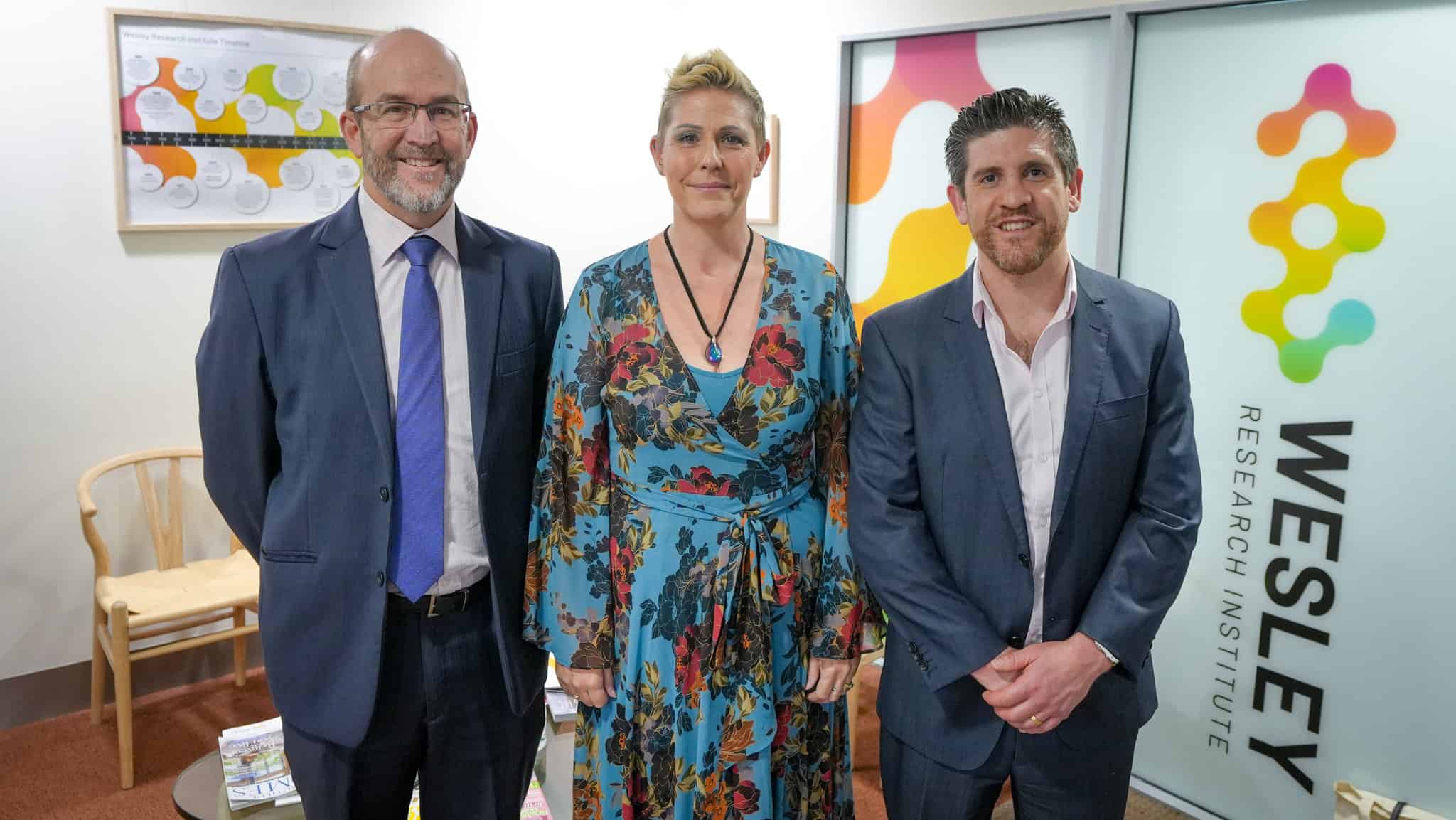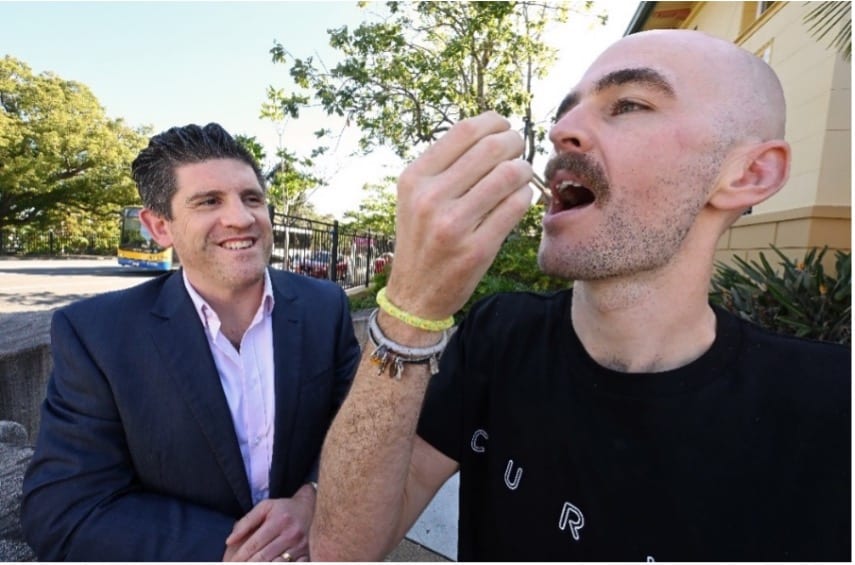
Brisbane, Australia: Australian researchers have published the first robust clinical study proving that medicinal cannabis is a breakthrough in treating the debilitating effects of Tourette Syndrome.
The findings will be released today (9 June 2023) in the US-based New England Journal of Medicine: Evidence.
For people like Chris Wright, who has suffered from severe and often painful tics since childhood, the treatment has been life changing. (See case study below)
“My tics were really painful, not to mention embarrassing and made me self-conscious,” Chris said. “The oil has reduced my tics by about 50 per cent and I have been able to read a book for the first time in 10 years.
“Some days I get home from work and realise I haven’t focussed on my Tourette’s the entire day. It’s changed my life.”
The ground-breaking clinical trial, sponsored by Wesley Research Institute (WRI) in Queensland, tested 22 adult patients with severe Tourette symptoms. In the double-blind study, participants received both medicinal cannabis oil and a placebo over two six-week blocks.
The results showed a statistically and clinically significant reduction in motor and vocal tics in just six weeks. The clinical trial was led by neuropsychiatrist Dr Philip Mosley a Research Fellow at the Wesley Research Institute and QIMR Berghofer Medical Research Institute.
“This is the first rigorous and methodical trial of medicinal cannabis to be undertaken in a sufficiently large group of people to make definitive conclusions about its effectiveness,” Dr Mosley said.
“It shows that medicinal cannabis can reduce tics by a level that makes a life-changing difference for people with Tourette syndrome and their families. In a short period, participants found that the number of tics they were having each day decreased substantially, whilst the tics that remained were less intense, less painful and less disruptive. These improvements were corroborated by independent assessors who didn’t know whether the participant was receiving active drug or placebo.
“In addition, we found that other symptoms associated with Tourette Syndrome in our participants also reduced, particularly symptoms of OCD and anxiety.
“The important aspect about this trial is that it gives people with Tourette Syndrome hope and more treatment options, particularly when other drugs have been unsuccessful, or the side-effects of those drugs have been intolerable.”
The Wesley Research Institute study was conducted in partnership with scientists from the University of Sydney’s Lambert Initiative and QIMR Berghofer Medical Research Institute, with support from the Tourette Syndrome Association of Australia.
The Lambert Initiative for Cannabinoid Therapeutics co-funded the study and analysed blood levels of cannabinoids amongst participants. The analysis found a significant association between levels of cannabis metabolites in the bloodstream and the response to active treatment.
Tourette Syndrome affects about 1 per cent of the population and is four times more common in men than women. A neurological disorder, it often begins in childhood and is characterised by involuntary movements and vocalisations, or tics. In some cases, including the participants in this trial, severe symptoms continue into adulthood.
Tourette's is also commonly seen alongside other neurodevelopmental conditions, such as Attention Deficit Hyperactivity Disorder (ADHD) and Obsessive Compulsive Disorder (OCD), which are also influenced by faulty wiring in deep regions of the brain.
“Cannabis interacts with specific receptors on nerve cells in the brain that are part of the body’s own “endocannabinoid” system. Effectively, stimulation of these receptors tightens a leaky filter that now stops the involuntary movements and vocalisations from getting out and being expressed by our participants,” Dr Mosley said.
Dr Mosley said Tourette Syndrome, and the uncontrollable movements that go with it, caused widespread and devastating physical, emotional and social problems for patients.
“Kids with Tourette's are often bullied and ostracised because of their tics. They might have learning difficulties, they might be inattentive, they might be hyperactive, they might have weird routines that they do, or they might make funny noises. As adults, they may have limited academic attainment so they struggle to find employment and may be discriminated against.
“I love working with people with Tourette's. It is a privilege to be able to help improve their quality of life and to give them another option in the armamentarium of potential therapies.”
Medicinal cannabis is available on prescription to approved patients. Patients are unable to drive a vehicle or operate heavy machinery while using the medication which is typically taken orally, in small doses, several times a day.

Case study – Chris Wright
Chris Wright (35) was one of the first to sign up for the WRI trial after years of grappling with the tics that caused him pain, embarrassment and controlled his life.
He started showing Tourette symptoms at aged seven and was officially diagnosed at 12.
“My tics were pretty bad - a lot of vocal tics, a lot of yelling, screaming and really violent headshaking. That was at seven. At 12, I tried a host of different medications and ended up going through multiple in a year. One of them put me in hospital with side effects,” Chris said.
“In my late 20s, my tics came back worse than ever. I was in such a bad place I was willing to try anything. I was looking for anything, any kind of hope, that could actually make a difference.
“The oil really changed my life. After the trial my tic markers had come down 50 per cent. There are times when I get home from work and realise I haven’t thought about my tics at all. That is very rare but it has only ever happened since taking the oil.
“The biggest thing, as simple as it sounds, is reading a book. When you've had something taken away from you for so long, and you can finally get it back again, it is really nice.”
About the study
The Wesley Research Institute study involved 22 participants with severe Tourette syndrome who were randomly assigned to a six-week treatment period with an oral oil containing 5 mg/ml of THC and 5 mg/ml of CBD, followed by a six-week course of placebo, or vice versa, separated by a four-week washout period. The primary outcome was the total tic score on the Yale Global Tic Severity Scale (YGTSS), and secondary outcomes included video-based assessment of tics, global impairment, anxiety, depression, and obsessive-compulsive symptoms.
Reduction in total tic score (at week 6 relative to baseline) as measured by the YGTSS was 8.9 in the active group and 2.5 in the placebo group.
In a linear mixed-effects model, there was a significant interaction of treatment (active/placebo) and visit number on tic score, indicating a greater decrease (improvement) in tics under active treatment. A significant effect of active treatment was also observed in a video-based assessment of tics, whilst obsessive-compulsive symptoms and anxiety also improved significantly under treatment with the active drug compared to placebo.
The Clinical Trial took place at Wesley Research Institute with analysis being conducted at University of Sydney Lambert Initiative and QIMR Berghofer Medical Research Institute.